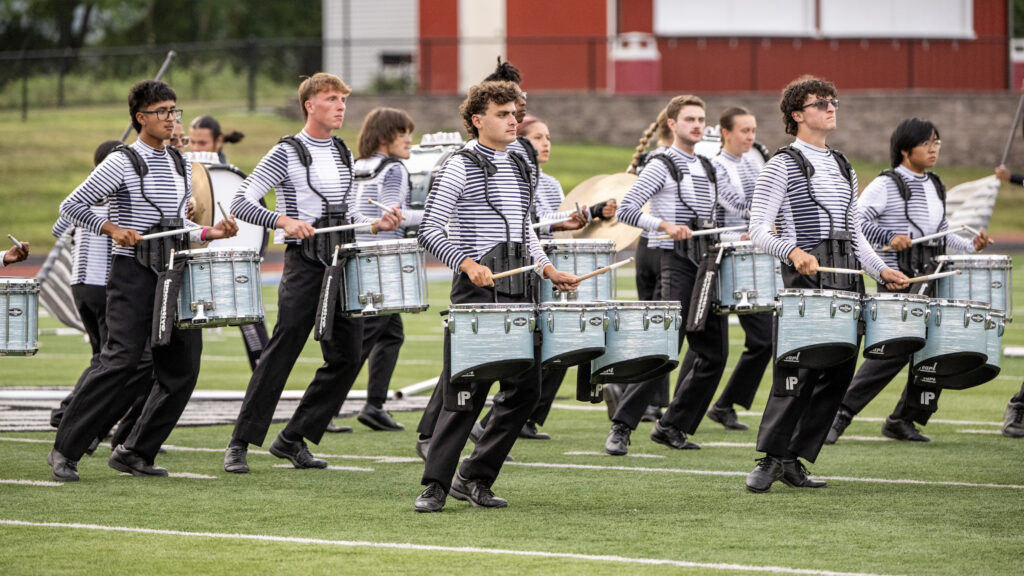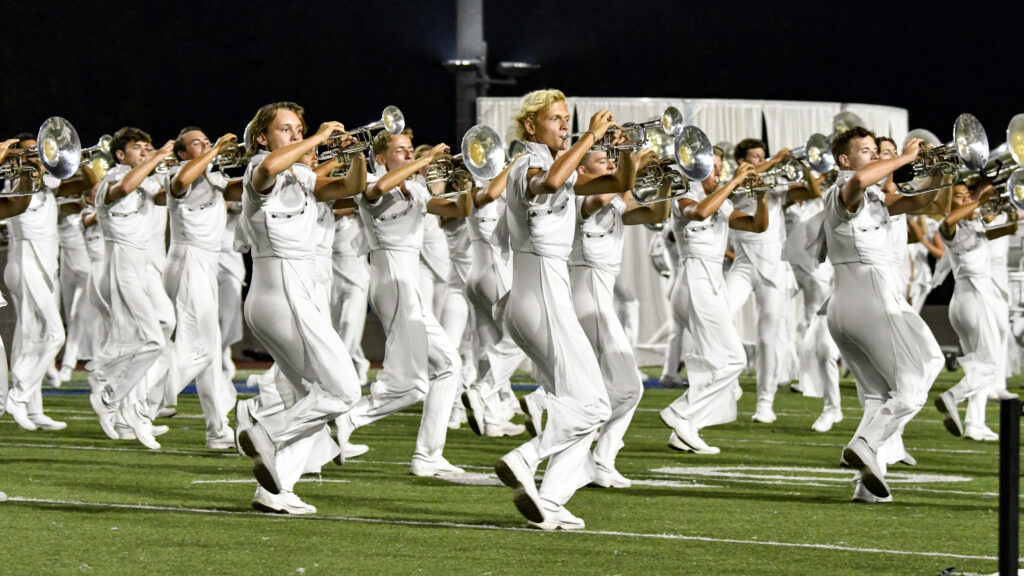Michael Boo: How long have you being Director of the United States Marine Corps Drum and Bugle Corps?
Brian Dix: Six years.
Michael Boo: How Why does the corps come to DCI?
Brian Dix: We made a conscientious decision six years ago that we wanted to be more active in our own musical community. It had an effect and it had a purpose, but in order for our drum corps to continue on a strong path, our presence needs to be a lot stronger. Our presence also shows younger performers that drum corps started from military roots. It’s important for them to know that. They need to know the history of drum corps. Drum corps is a family. It’s a community. I think it’s historic. We need to keep close ties with that community.
Boo: What is different about coming to DCI than going to any of your other gigs?
Dix: It’s like … no matter what city we perform in while at DCI, it’s a hometown crowd for us. It’s heartwarming and enlightening and emotional.
Boo: Do you get many members from doing this?
Dix: The Marine Corps does recruit a lot from people who march drum corps. Less than 2 percent of those who enlist in the Marine Corps from events we attend ever come into The Commandant’s Own.
Boo: What is there about a drum corps member that is so perfectly suited to the Marine Corps?
Dix: They have the patience and discipline to work things out to a correct ending. In today’s society, everything is so “now.” Someone who marches a drum corps may learn a piece of music in October and won’t perform it in public until June, which requires quite a bit of discipline. The Marine Corps’ foundation is planning, training and performance, whether you’re performing with live ammunition or a musical instrument.
Boo: So having the Marine Corps attend the DCI World Championships each year has many benefits?
Dix: I think it’s a comfort zone for the American people. They enjoy seeing Marines and seeing them in their own personal venue. It’s part of the hometown crowd appeal. The Marines in the booth don’t actually draw people into the booth to tell them about the career opportunities. It’s more about comfort and family … people drop by to say “hi” and tell those working the booth about relatives in the Marines.
Boo: What about the pull-up bar?
Dix: One of the basic requirements to be a Marine is physical fitness. Before a potential Marine can be a candidate, they have to be able to be able to do three pull-ups from a totally “dead man” position. More often than not, the pull-up bar is a nice medium to say, “Hello, how are you?” The uniform that way does not intimidate them. It’s a nice comfort zone for drum corps marchers who have been in training for months.
Boo: And that Humvee?
Dix: The Humvee out there plays drum corps music. It has all my Marine drum and bugle corps CDs, which the recruiters love to play. It’s a good draw and it attracts all sorts of crowds. There are eight Humvees that travel the nation for such events. Everyone wants to see the Humvee. It’s like when visitors come to the Barracks at 8th and I in Washington, they want to see our mascot, the bulldog. The fun part will be Saturday when the Marines get here and do their field show. We have 24-minute program. Our “Music in Motion 2004” is not only effective for drill, it’s good for concerts. I believe last year I directed 85 different concerts, so the music has to accommodate both.
Boo: Do you have many DCI marchers in the corps?
Dix: Less than 30 percent of the Commandant’s Own have marched DCI, and less than that have marched Finals. It’s such an honor for the corps to be here, but even more than playing the field show at the beginning of Finals, they enjoy marching the 12 corps on for retreat because they’re playing for all the corps. That’s someone no one has the ability to do but the Marines, and we thank DCI for that.
Boo: You worked under Col. Truman Crawford.
Dix: When I first met him in 1984, he was still Major Crawford. He taught me one valuable lesson … there are no guarantees in life. Everything is a matter of preparation. He taught me how to prepare for everything, not just a rehearsal. I had to prepare for marketing, trips, how to get the Marines to sleep, deadlines, financial accountability, administrative responsibilities. Everything is a matter of how well you are prepared for those daily challenges. Regardless of how a situation turns out, it’s how well you’re prepared to follow up after a “guarantee” has just fallen through.
Boo: What do you want us to know about the Marine Corps drum and bugle corps that we might not know?
Dix: Every performance is personality driven. As a director, I’m a strict autocrat when it comes to total musicianship and marching and music execution. However, the most junior Marine working with section leaders and instructors—whom all march—have input in the direction of the music and the total direction of the program. The reason it works is I hold them accountable to their judgment regarding marching and musical stylings. I have an excellent percussion writer, who swore to me there is an instrument there was called a lense drum. This drum could recreate the sound of the ship’s lanyards clanging against the mast of the ship. I wrote the music for “Pirates of the Caribbean” around that one piece of equipment. It was his call and the drum works. For a brief moment, the Marine Drum and Bugle Corps lets our guard down when we play our music, and the fans can see and hear our personalities. But when the show is over, they’ll see Marines.





